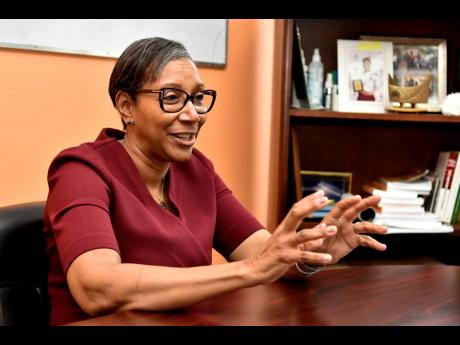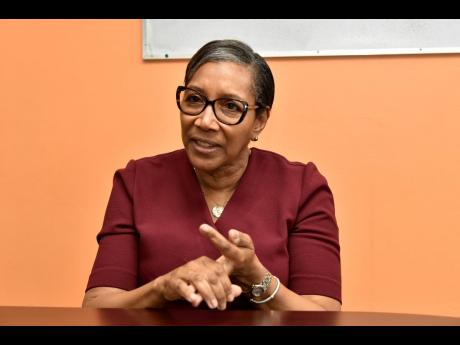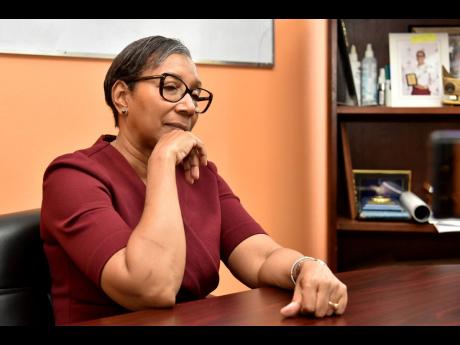‘An academic with a beautiful mind’
Dr Heather Ricketts steps into UWI’s history as the first female dean of the Faculty of Social Sciences
Dr Heather Ricketts has smashed the iron curtain of male dominance of the deanship in the Faculty of Social Sciences at The University of the West Indies (UWI), Mona campus, becoming the first female and its fifth dean.
The eyes of all the men before her watch her entrance and exit from their portraits on the wall in the hallway to her office, and even as she acknowledges their academic brilliance, she is wearing her own size shoes, not interested in filling others.
Even if they did, the style would definitely be different.
Salutations have greeted the promotion of the Grenadian-born Caribbean woman, with relatives by blood and marriage in several territories.
A sociologist, Ricketts holds a PhD in Development Studies and is a former head of the Department of Sociology, Psychology and Social Work at The UWI. She entered academia after years in the public sector and is the face behind many documents that have informed public policies over the years.
She describes as invaluable the gains made in areas of social policy, research, development and analysis, and how that life has become critical to her current position. Being dean encapsulates the depth and breadth of her knowledge and experience in her former life.
Her genetic footprint can be found in several islands, but she considers herself a true daughter of the Caribbean even as her students, current and former co-workers describe her as “an academic with a beautiful mind” whose intellectual rigour has been surgical long before she took up the position on August 1, 2022.
“I see myself as a daughter of the Caribbean, as my roots run widely across the region. My mother is Trinidadian. I am born in Grenada. My father is Grenadian. Both my parents met working with the federal government. Daddy left Grenada to work in Trinidad. They met, married and went back to Grenada. They have three children. I am the only girl, in the middle of two boys. I lived in Grenada until the revolution (1983) which caused us to go to Trinidad,” Dr Ricketts explained during an interview with The Sunday Gleaner.
Her maternal grandmother was Barbadian, and her maternal grandfather’s parents were Vincentians. Her father’s grand-uncle and her aunt married Jamaicans, and so did she.
The wife, mother and academic is immersed in all aspects of life via research and leadership at various levels, and in various sectors. She is in no competition with the legacies established before her; she is creating her own.
“I would have to wear my own size as the first female dean, as my colleagues like to say all the time. Let me tell you about me. Yes, I understand how important this is for my sisters and also for the faculty and maybe the university, too. When I say my sisters, I mean my sisters in the faculty. But I have not worn it as a badge of honour or anything. I have always been required to do hard work, and so I just roll with whatever is given, and wherever I find myself,” she explained, adding that the support has been tremendous since she assumed the post.
The department has an all-female administrative staff, which is not surprising as such functions are typically held by women. Ricketts is supported by two female deputy deans (a capacity in which she served before her promotion) and another female associate dean.
Her elevation is celebrated as well deserved in the faculty, and a year prior she received the Vice-Chancellor’s Award for Excellence for outstanding service to the university community.
SOCIAL SCIENCES PLAYING A CRITICAL ROLE IN JAMAICAN LIFE
Social scientists are critical to nation-building, as their discipline involves the study of societies and individual relationships, and the behavioural dynamics between governments, people and institutions.
Ricketts dispelled the notion that social scientists at The UWI are not as visible as former years, telling The Sunday Gleaner that they remain critically important to the Jamaican society and are participating in Jamaican life.
“Currently, members of this faculty sit on numerous boards and committees (over 200) within the society, including public and private sector boards, and non-governmental boards, etc. We give a lot of expertise to these bodies,” said Ricketts, who also sat on the Labour Market Reform Commission for two years, chairing the social protection subcommittee.
“If you look at the area of crime, we don’t have a criminology major in the faculty. We have a minor, and we are intending to introduce a programme with Dr Herbert Gayle, in violence studies. We hope that we will get there soon, maybe in the next two or so years.”
She continued, “Perhaps there have been more of a focus within the last two or so decades, on more academic writing; producing more journal articles and book chapters. There was a time, when, I suspect, social scientists, persons in the academy, were more readily seen. I know Don Robotham, for example, would call the talk shows, so people heard them all the time wrestling with important issues.”
A student of Professor Robotham, Ricketts named Dr Michael Witter, Dr Alvin Wint and Dr Edwin Jones as public advocates in that era. Currently, others such as Dr Andre Haughton, Dr Herbert Gayle and Damion Gordon are public voices of the faculty.
ADVOCACY IS ALIVE
Advocacy, Dr Ricketts said, has not died, while acknowledging that the format has changed. Although they are not in the public space, their contribution to policy is immense.
“We are actually doing a lot of academic searching for solutions, academic writing. To some extent, some of our academics are focused there, so the kind of public advocacy that we became accustomed to years ago has waned a bit because of the academic publishing. But we are as engaged as ever,” she said.
Students’ activisms also appear dormant.
Influenced largely by the Black Power Movement in the United States, issues such as apartheid in South Africa, resulting in the decades-long imprisonment of Nelson Mandela, were foremost in the minds of students decades ago. They railed against local, regional and international issues. Injustices and inequity impacting the marginalised in societies would be grounds for activism, highlighting the problems. Lecturers would join in solidarity and student bodies on other campuses would also join.
Among students today, activism is diverse, Dr Ricketts said.
“I think it’s a mixed bag. You have those who just want to graduate. They are not interested in anything else. They just want to get the degree and get out and not engage in the kind of activism of, as you call it, the glory days,” she said.
“In the 1980s I was an undergraduate student at St Augustine (Trinidad and Tobago) and we would always hear about the Black Power Movement and so on. The kind of consciousness of my generation and the generation before was more international.”
Locally and regionally, activism crafted an identity through institutions such as the West Indies cricket team which dominated world cricket and which connected the Caribbean region. Sadly, she believes, many of those gains are now taken for granted, suggesting that many of today’s future leaders do not understand or appreciate the struggle which earned them some rights they currently enjoy. The lack of engagement by many appears to be grounded in their view of themselves and the society in which they live, she opined.
STUDENTS IN POVERTY
Student poverty is a major concern for The UWI and the social sciences faculty.
Dr Ricketts acknowledged that many students are facing real hardship on the campus. Her department and others have been devising poverty alleviation methods to assist many on the fringes. Ricketts’ deep affinity for them, and their needs, as well as their emotional well-being, are foremost. For her, the role of a lecturer is not “simply academic, but rather broader, helping students achieve their potential but without committing ethical, procedural or legal breaches”.
This stance is a function of her discipline and training, but she is also acutely aware of the tremendous stress it carries. With the help of the alumni, other students and the private sector, the faculty is seeking to establish a permanent food cupboard to provide struggling students with something to eat. GraceKennedy has already given a one-off contribution.
So distressing is the situation, the sociologist noted, that many students have become library dwellers, opting to study all night and showering at a hall of residence and be ready for classes the next day.
Sadly, the university, and all its issues are a microcosm of the wider society.
“We are now trying to see if we can have dried goods, tin stuff available in the faculty so that a student can come in and get something to eat. We have to contend with this,” she said with sadness but an understanding of real poverty in the society.
Such social issues influence the university’s strategic plans, and for the five years, 2022-2027, themed the Revenue Revolution, the objective is focused on access, alignment and agility. All faculties are required to develop their own operational plans around The UWI’s plan and theme.
Accountability to students is paramount, directly impacting the financial viability of the university, notwithstanding the multibillion-dollar contributions under the funding regime.
Even as there is an understanding and appreciation for the economic hardships being experienced, it has not taken away from her teaching philosophy, and demanding the best from students.
That philosophy is grounded in helping students learn and appreciate the fundamental course content, by developing critical thinking; preparing them to function effectively in their field; and inculcating interest in, and, if possible, a passion for the discipline.
Known as a thorough marker, which is loved and feared alike, Ricketts told The Sunday Gleaner that she grades students’ work “for everything”, including English, which is still the language for presentation.
PUBLIC LIFE, FAMILY
Dr Ricketts’ research at The UWI has impacted policy and development in Jamaica and the Caribbean region. Her research focuses on gender-equity in the labour market, parenting, and the analysis of living standards, with implications for social policy.
She has been studying the measurement of time-use in Jamaica, paying specific attention to gender, particularly male and female participation; time spent engaged in unpaid care and domestic work; and issues of time poverty. During one particular research, she was shocked by data showing that 20 per cent of parents did not enjoy parenting.
Those issues are not singular to Jamaica. All territories are struggling with similar social and economic problems of crime, unemployment, poverty, incivility, absentee fathers, and mothers who were not necessarily doing the best job because of the many roles they have to play.
A strong believer in the family, it’s an institution in which she places high importance as a key body to the orderly development of societies.
During the COVID-19 pandemic, many homes were deemed unsafe for children and young people. There is also increasing distrust of churches and church leaders, as several have been found to be predators.
Dr Ricketts acknowledged, however, that a large segment of the Church has contributed significantly to Jamaican life.
“I think if we get the family right, a lot of other problems in the society will be fixed. I have a big plan, and I have been writing a chapter for a long time. I am proposing a family policy for Jamaica. I hope that by the end of the semester I will be able to complete it,” she disclosed.
She believes artists and sportsmen and women are catalysts for more regional connectivity and integration, but noted that intra-regional travel costs are prohibitive.
Ricketts wants a real Caribbean Single Market and Economy (CSME) to operate similar to European countries, where immigration is encountered at the first stop.
Despite her busy public life, Dr Ricketts has served on many committees and boards at The UWI, as well as external. She loves and enjoys teaching, sharing that it is one means to providing an informed understanding of some of the challenges the Caribbean faces and helping find solutions.
If students leave her courses with a sound, working knowledge of the content, an even greater passion for their discipline, and, with application, advance the Caribbean, Dr Heather Ricketts will not only be happy, but contented that she is making a positive impact.



